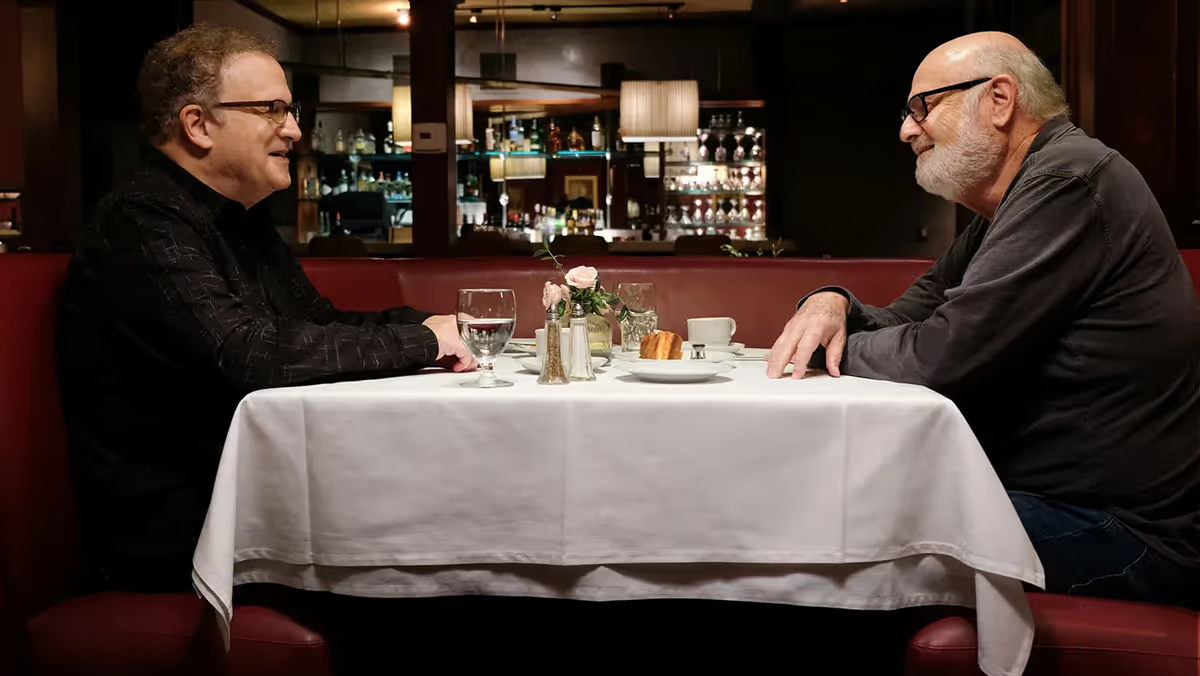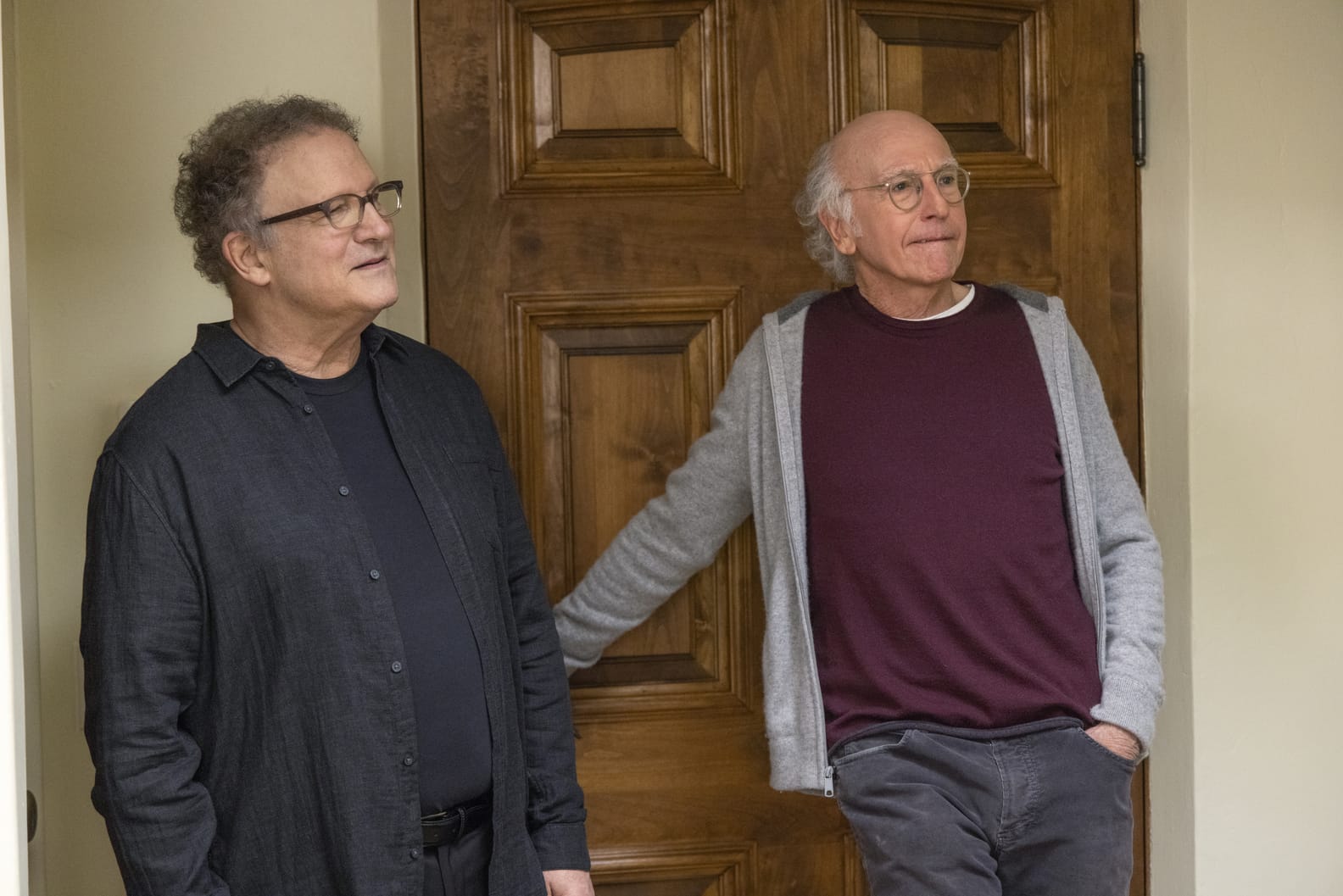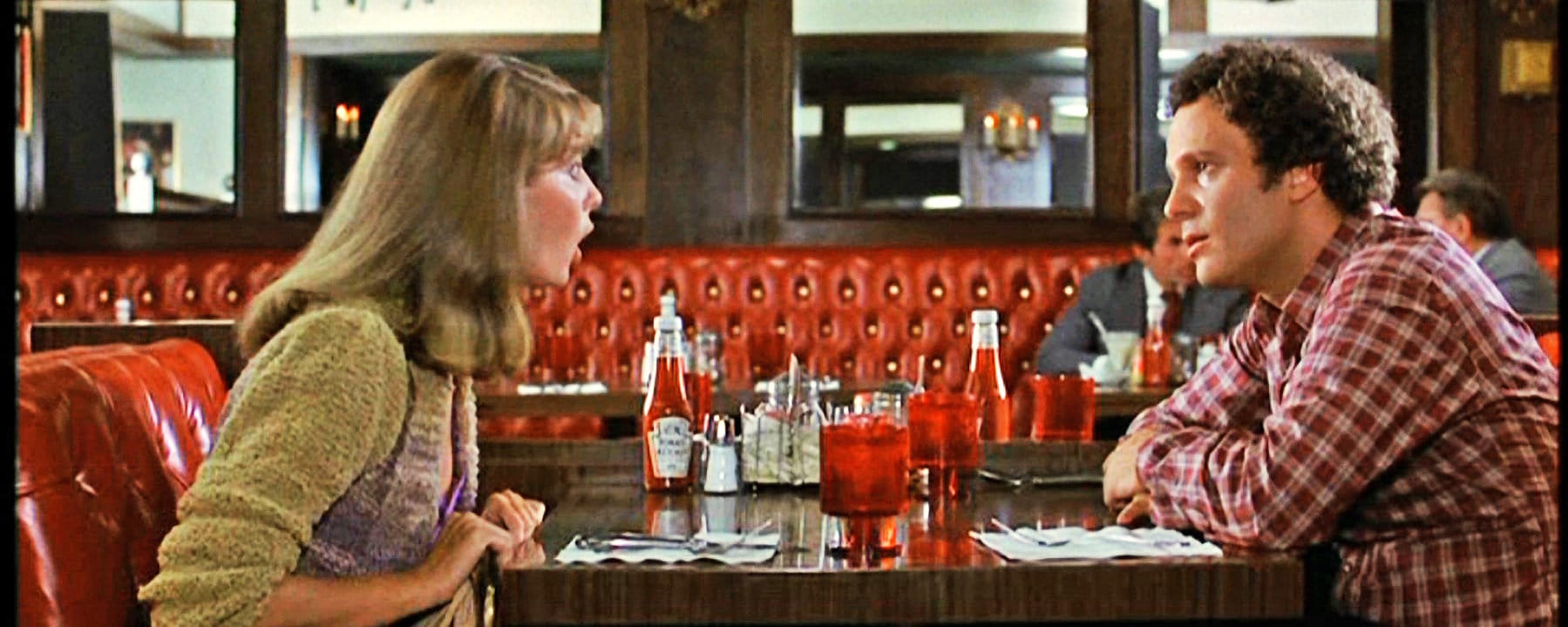Traveling the Road of Albert Brooks
With his new Max documentary on Albert Brooks, Rob Reiner makes the case for his friend as uniquely brilliant comic mind. Who am I to disagree?

“I had a very famous agent and he said to me, ‘I don’t know why you always take the hard road.’ And my answer was, ‘You think I see two roads.’” — Albert Brooks, Defending My Life
I have three pop culture heroes: Martin Scorsese, Neil Young, and Albert Brooks. Of the three, I’ve only met Albert Brooks, but it turned out to be one of the more serendipitous moments of my career. At the time, Warner Independent Pictures—the most absurdly named of all the doomed boutique studio labels that came and went in the early 2000s—had carved out a piece of its minuscule marketing budget for Brooks’s Looking For Comedy in the Muslim World for a press tour and I got 20 minutes for The A.V. Club. (We stretched it past 30.)
It was a wide-ranging interview, covering not just the new film, but Brooks’ legendary appearances on late-night television, his work as a character actor, and the guiding philosophy of Defending Your Life. At the end of the interview, Brooks graciously complimented me on my questions and I sheepishly mentioned to him that I had written an incomplete master’s thesis on his first five films as writer-director. He smiled at that, though he probably would not have smiled at the reason it was unfinished: I was poised to get a full-time position at The A.V. Club in Chicago, so I spent the summer of 1998 watching the World Cup on TV instead.
The Reveal is a reader-supported newsletter dedicated to bringing you great essays, reviews and conversation about movies. While both free and paid subscriptions are available, please consider a paid subscription to support our long-term sustainability.
Cut to February 2017. Anna Thorngate, then the managing editor at the Criterion Collection, reached out to me to see if I’d like to write the essay for the Criterion version of Lost In America. She said that Brooks himself had suggested me, having appreciated what I’d written about him in the past—and he’d mentioned the master’s thesis, too. Needless to say, I was thrilled beyond words at the opportunity and thrilled again when the essay, “The $100,000 Box,” was published and Brooks himself reached out to thank me personally. (Criterion would later enlist me to write essays for Jabberwocky and I Wanna Hold Your Hand, so I owe him a karmic percentage on those, too.) One of the most exciting aspects of writing that Lost In America essay was getting the chance to assist in Brooks’ canonization as one of the great directors of American comedy. That’s why I’d chosen that thesis topic at the time: He’d made these five original, provocative, ingenious comedies that simply were not getting the attention they deserved.
The new Max documentary Albert Brooks: Defending My Life makes the argument for Brooks’ genius emphatically, albeit with a much larger scope than I had intended. It’s a little bit easier to defend the life of this comedian’s comedian when you look at the entire oeuvre—the late-night bits, the Saturday Night Live shorts, his work as an actor and voice talent, et al.—rather than five films that deserved far more attention than they got. (Especially when compared to another Jewish writer/director/star who turned out a movie per year for half a century.) The doc’s director, Rob Reiner, has been Brooks’ friend since high school 60 years earlier, when he was still using the audacious name his parents had given him, Albert Einstein. (Their classmates: Richard Dreyfuss and the children of Lee J. Cobb, Groucho Marx and Joey Bishop.) The core of Defending My Life is a simple sit-down interview between Reiner and Brooks, built out with clips and a vast array of talking heads.

More than one critic has likened the documentary to the brilliant episode of Curb Your Enthusiasm in which Brooks, playing himself, has arranged for his own memorial service so he could experience it while he was alive. (As usual, Larry David turns it into a fiasco that, among other things, reveals Brooks to be a COVID hoarder. Brooks’ killer retort: “I just moved in here! This used to be a CVS!”)
Calum Marsh at the New York Times called the film, “wistful and hagiographic, it’s the kind of thing that usually accompanies a lifetime achievement award.” That’s a reasonable take on the film, too, especially when you think about what Brooks himself might have done with such an assignment. If he were making a documentary about himself, he’d probably offer another ruthless dismantling of the needy, jealous, hostile, narcissistic “Albert Brooks” character he’s lampooned so many times on screen. And even if he were making it about Reiner, his friend, he’d probably find some way to pick apart the very idea of doc-profile form—maybe a mock-mockumentary in reference to Reiner’s This is Spinal Tap.
And yet, to quote the judges in many a procedurally dubious courtroom comedy, I’ll allow it. There are artists less deserving of a hagiographic treatment—virtually all of them, in fact—and Reiner’s strategy is to flood the zone with as many famous admirers as possible. The talking heads have the stratification of guest tables at a wedding, with Brooks’ direct collaborators (chiefly James L. Brooks, but also Judd Apatow, David Letterman, Sharon Stone, Larry David, etc.) on the dais, a who’s-who of comedy stars (Conan O’Brien, Chris Rock, Jon Stewart, Ben Stiller, etc.) a phone zoom’s distance, and an assortment of random admirers (Jonah Hill, Anthony Jeselnik, Alana Haim, etc.) parked in a distant corner. (In this scenario, Brian Williams and Neil deGrasse Tyson accidentally wandered in from the reception next door.) Reiner’s odd refusal to survey his critical admirers has the unfortunate effect of making the Brooks cult an insular Hollywood phenomenon, like a gathering of aesthetic Scientologists. There’s precious little insight to undergird the enthusiasm.
What the documentary does have going for it is Brooks, so even when the chorus can’t make a substantive argument for him, the assortment of clips and his own personal reflections and reminiscences do the job. When I was researching my Brooks thesis, a benevolent fan sent me a VHS compilation of his SNL shorts and various talk-show appearances, and several of his best bits are sampled in the doc: His ventriloquist act on The Flip Wilson Show, his “impersonation kit” on Carson’s Tonight Show (you will never see Carson laugh harder), the “Famous School For Comedians” short that was the precursor for SNL. (Not in the doc, but always on my mind: Brooks’ “Fall Preview” for SNL, which includes Black Vet, a show about a Black Vietnam veteran who’s also a veterinarian, and a staging of Death of a Salesman performed entirely by children.)
For me, those shorts and late-night segments are crucial in understanding the sensibility that Brooks would bring to his movies later. Before he ever made a feature, he was already the comedy world’s premier deconstructionist, breaking down various forms (miming, impressions, improv, ventriloquy, the spit-take) into crude component parts. When he finally got a chance to make a film with 1979’s Real Life, Brooks seized on An American Family, the hit PBS documentary series about the Loud family, to parody the idea of documentary naturalism and the notion that everyday behavior is somehow not dramatically affected by the presence of a camera. That the “Albert Brooks” character in Real Life is a Hollywood phony, rather than the next Frederick Wiseman, makes the film funnier, as he insinuates himself into the lives of the Yeagers of Phoenix, Arizona. He cannot suppress his commercial instincts, even if it contaminates his doomed experiment.

Brooks’s best films share that same powerful conceptual hook: A couple that’s bound by jealousy and near-pathological hang-ups in 1981’s Modern Romance; a wealthy Baby Boomer couple in Lost In America that attempts the free-living of Easy Rider with the security of a luxury Winnebago and a large “nest egg”; the celestial office park in Defending Your Life where the newly dead are judged for the fear that governed their time on Earth. Reiner’s documentary covers all seven of his features and commercial frustration that tended to follow, ending with Looking for Comedy in the Muslim World, which Brooks had the nerve to premiere at the Dubai International Film Festival. His willingness to fail may be the theme of his life, as evidenced by his refusal to try out new material in clubs before going on national television or sitting next to a sheik in Dubai as his character is questioned sharply over whether he’s a Jew. (“Not all of the time,” he replies.) If Brooks himself were on trial in Defending Your Life, even a lawyer using 3% of his brain could convince the judges to allow him to pass to brighter destinations.
Yet only rarely, like in the beautiful final moments of Defending Your Life, does Brooks show himself that kind of mercy. One of the unfortunate gaps in Reiner’s documentary is that there’s no follow-up on Brooks’ mention of Monica Johnson, his co-writer on Real Life, Modern Romance, Lost In America, Mother, and The Muse, who died in 2010. Brooks talks about Johnson as the one responsible for the “Albert Brooks” character, which is so important to understand his uniqueness and value as a screen presence. So many writer-directors put themselves on screen as an act of vanity—or, in the comedies, as a form of gentle self-deprecation—but Brooks is the least ingratiating of screen comics, always eager to present himself as petty, hostile, self-involved and just barely redeemable. That probably accounts for why commercial success has always been so elusive to him and why his agent talked to him about always “taking the hard road.”
That’s the only road he’s ever seen. It is the road less-traveled.




Discussion